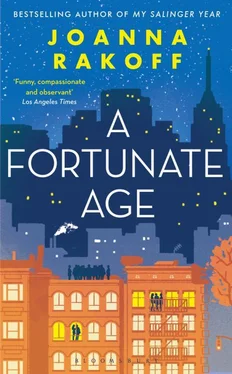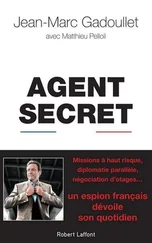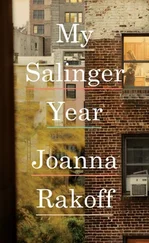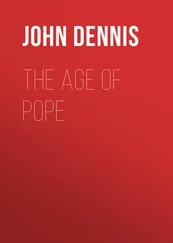Tal looked at Sadie for the first time, she realized, since his arrival, and stretched his long hand out toward her on the table. Did he mean for her to take it?
“Tal,” she said. “The bartender might be able to give us directions to the cemetery that bypass the LIE.”
“I just don’t get that you could think that the world offers one truth,” Tuck said. “You went to Oberlin .”
Tal turned from Sadie, taking a quick gulp of his drink. “So?” he said finally.
Tuck stared at him. “Well, it’s just so archaic. It’s, like, premodern. Our generation, we’re post modern. There is no one truth. The truth isn’t a fixed thing. It’s subjective.”
Suddenly, Tal began to laugh. Tuck let out a little chuckle, too, either out of sympathy or confusion. “I loved Kierkegaard in college, too. But it doesn’t really hold up, you know. Life just isn’t like that. Things are much more black-and-white. She loves you or she doesn’t. You have a job or you don’t. Your parents are alive or dead.” Sadie started at this. Had his parents died without any of them knowing it? Surely he would have told Dave, at least. “The truth is the truth. Incontrovertible facts. How it makes you feel, that’s subjective.” He paused, gauging the length of Tuck’s fuse. “You’re a journalist, right? Isn’t it your job to present the truth?”
Tuck snorted, downed his drink, and waved his hand at the bartender, signaling for another round. “Please. You don’t really believe that Woodward and Bernstein bullshit.” The drink arrived and Tuck looked at it suspiciously, as though it had come unbidden. “You can drink?” he asked Tal.
“I’m not Mormon.” Tal laughed.
But Tuck did not smile. He wrapped his hand around the tumbler of scotch and raised it eagerly to his mouth, flicking his eyes from Sadie to Tal.
“So you had a thing for Lil, right?” he asked suddenly, his tone becoming brisk and efficient.
“No,” said Tal, before Tuck had even got the words out. Still, he was too late. Tuck’s face was already twisting into a closemouthed smirk.
“Not even in college?” He raised an eyebrow. “All those late nights at the radio station?”
“No,” said Tal, smiling and tilting his chair onto its back legs.
“I knew it.” Tuck laughed, clapping his hands. “I’m a very good judge of character. She used to say you were in love with Dave. And you fell in love with Sadie because she was a version of him that you could actually have.”
Sadie sighed. She’d heard this from Lil, too, a zillion times, and now, hearing it from Tuck, she felt deeply bored. She supposed Tuck wanted to shock them.
“But I always thought it was because she was a version of Lil you could actually have.”
Was this true? Sadie wondered. No, certainly not. In college, they’d been close, Lil and Tal, and at one point the rest of them had speculated, but they’d speculated about everyone. Though there was that night—which year? junior or senior?—when she, Sadie, had asked him about Lil—why? Had she wanted him, way back then? Had she wanted proof that he didn’t want Lil more than her? Was she such a monster of vanity, unable to imagine a world in which men and women didn’t trample one another vying for her friendship? No, no, of course not, on all accounts. They’d just been talking—they were friends —and he’d told her, without hesitation, something that had made no sense to her at the time. “If Lil became my girlfriend,” he’d said, “she wouldn’t be Lil anymore.”
“What do you mean?” Sadie had asked him querulously. “How could she not be herself? She is herself.”
“No,” Tal insisted. “She’d be diminished .”
Now, a decade later, she finally understood what he meant: marriage had, certainly, diminished Lil—made her petty and sad and afraid and certainly less than the sum of her parts. And this was because of Tuck, yes, but it was also Lil—she had, somehow, allowed it.
“Sadie,” Tal said to her now, but she would not look at him, no, she would not.
“I’m going to talk to the bartender,” she said. Five minutes later she had directions, in blue ink, on a plush cocktail napkin. “Let’s go,” she said, hoisting her bag on her shoulder.
They left the small parking lot, with its cluster of dinged, dated cars, and continued through the low, gray town and onto the sort of artery that gave Sadie a chill: mile after mile of auto dealerships and strip malls and gas stations and Bennigan’s and Applebee’s, streams of people inexplicably filing into their depths.
“We’re in hell,” Tuck droned, his large forehead pressed to the window, and Sadie, for once, was inclined to agree with him. “This is what Atlanta looks like now. Hell. The fucking Roths would make us come out here.”
There was traffic on this road, too—presumably other travelers trying to bypass the expressway—and they missed every light. Tuck slowly began to beat his head against the window.
“I bet everyone else is stuck, too,” said Sadie. Tuck shrugged, his face still turned to the window, in the posture of a sullen twelve-year-old. But as the road narrowed and the shopping centers grew farther and farther apart—they were getting closer, Sadie was sure—he sat up straight and folded his hands tensely in his lap.
“I know you all think this is my fault,” he said. “Everything that happened.”
“No,” said Sadie. “We don’t.”
“No,” said Tal. “None of us think that.”
“See,” Tuck nearly shouted. “That’s what I just couldn’t stand . The ‘we.’” He mimicked Sadie: “‘Oh no, we don’t blame you.’ I got so sick of hearing about your little group . Your perfect, interesting little lives. Your interesting jobs. Your stupid perfect families.”
“If you knew my father,” said Tal, grinning at Sadie. “You wouldn’t say that.”
“ No ,” said Sadie, staring sadly out the window. They were passing by a set of enormous mirrored cubes—a brand-new office park—in which she saw Tal’s silver rental reflected a thousandfold, her dark head a small point within it. Her breasts still chafed and itched. The milk she’d expelled into the bar’s rancid sink had just barely taken the edge off. Mina was a hungry girl and, already, more milk was coming in. And yet, now, her children, Ed, felt very far away. She could imagine, for a moment, casting herself into Tal’s arms and leaving everything behind, telling him to just drive. “Tuck, I don’t get it. Were we ever anything but nice to you? We tried so hard . We wanted Lil to be happy.”
Tuck snorted. “Happy? Lil? How could she be when she was always comparing herself—and me—to all of you?”
“What?” said Tal. “That’s crazy.”
“Wait, wait, wait,” cried Sadie. “Was that—” She grabbed the napkin off the dashboard. “I think we should have turned left at that light. By the first office building.” She held the napkin up and tried to make out the bartender’s slanted, half-formed cursive.
Tuck was still talking. “All of you went on with your lives, but she still wanted to be the center of all of your attention, like in college, when she was special . I could never make her feel as special as you all did.”
“Please stop,” she said, “let me just look at this.” They were deep inside the complex now, the too-bright sun glinting off the endless rows of mirrored cubes. It was odd, Sadie thought, to think of the workers inside them, thousands of them, invisible to passers-by, typing memos and inventing numerical codes for dental procedures and answering the calls of those defeated by the instructions supplied with their DSL modems.
Читать дальше












